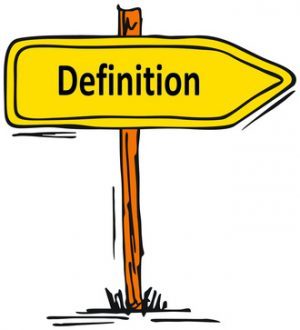36 Writing Formal Definitions

In academic writing, formal definitions play an important role in the expression of content knowledge. You may need to write definitions in these tasks:
- In an exam, to define key terms and phrases to demonstrate your understanding to your instructors.
- In an essay, to define key terms and phrases to clarify the meaning of key terms that are crucial for your readers to understand your arguments.
Definitions are also helpful when a word has multiple meanings or to explain new concepts, trends, or processes. Misinterpretation can occur when these important words are not clearly understood, leading to confusion or disagreements.
There are two types of definitions that you may need to use in college:
-
Three-Part Definitions
These are considered formal definitions that include as much information as possible within a sentence. Since the aim is to avoid misunderstanding with your readers or audience, a formal definition follows an orderly structure with three sequential parts:
-
- The concept (word or phrase) to be defined.
- The broad category to which the term belongs.
- The differentiating characteristics that distinguish it from all others in the broad category.
Three-part definitions
A —————-> B —————-> C
“A” stands for the concept, i.e., the word that is being defined.
“B” stands for the category to which the word or phrase belongs.
“C” stands for the characteristics that make the word different from others.
To express the characteristics (“C”), you need to do it with a clause marker which could be:
- a preposition plus “which”
- a preposition plus “whom”
- “that”, “who”, “where”
Typically, you will need to define key terms in short essay exam questions or even during oral presentations if someone asks you, for example, “Could you repeat what X means?”. These short, formal definitions are also useful to clarify the meaning of abstract or intangible concepts (for example, “friendship’ or “mathematics”).
Examples:
A bedroom is a room in a house in which people sleep.
Sadness is a facial manifestation that expresses personal troubles.
A professor is a person who teaches at a university.
A President is the leader of a country in whom people trust.
More formal definitions:
ConceptA university is |
Broad Categoryan institution |
Differentiating Featureswhere knowledge is produced and passed on to others. |
Social Economics may be defined as |
the branch of economics |
[which is] concerned with the measurement, causes, and consequences of social problems. |
Research may be defined as |
a systematic process |
which consists of three elements or components: (1) a question, problem, or hypothesis, (2) data, and (3) analysis and interpretation of data. |
Braille is |
a system |
of touch reading and writing for blind people in which raised dots on paper represent the letters of the alphabet. |
Exercise: Write formal definitions of the abstract concepts given below. Make sure that the verb agrees with the subject:
1. Earthquake- movement of the Earth – product of internal pressure
What is an earthquake?
_________________________________________________________
2. Satisfaction – psychological response – result of goal achievement.
What is satisfaction?
________________________________________________________
3. Friendship – emotional bond among people – like and respect each other.
What is friendship?
________________________________________________________
4. A biologist – scientist – study living organisms.
What is a biologist?
________________________________________________________
5. A conversation – exchange between or among people – want to express their thoughts, opinions, and feelings.
What is a conversation?
________________________________________________________
The content on this PB page has been paraphrased from the websites below. Ideas have been blended to configure this information. For specific details, and to learn more about these topics, visit:
- https://owl.purdue.edu/owl/general_writing/common_writing_assignments/definitions.html#:~:text=A%20formal%20definition%20is%20based,avoid%20misunderstanding%20with%20your%20audience.
- https://www.westerntc.edu/sites/default/files/student-life/documents/OWC/Definition.pdf
- https://www.phrasebank.manchester.ac.uk/writing-definitions/

